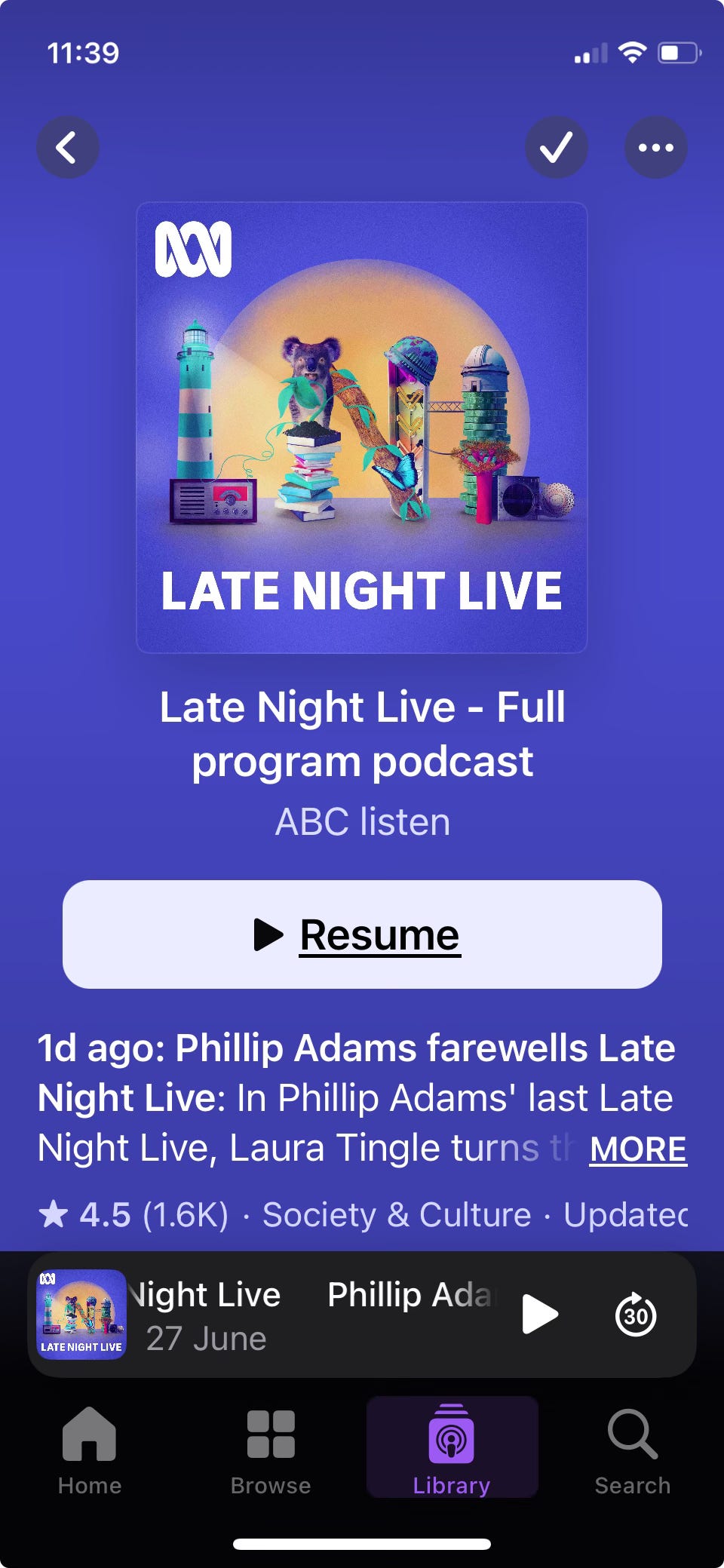I didn’t see the Biden Trump debate, nor the Sunak Starmer debates - but it would seem to be a plausible scenario in both electoral processes that the outcome is all but assured. The polling has been pretty consistent for the likely winners for some time.
Starmer will win in a landslide. Trump, (which pains me to write), will probably also win in a landslide. Australia is a net policy importer - and ideas from the UK and USA regularly find their way into future Labor and Coalition policies. It’s worth taking a look at what is on the menu in Westminster and the White House, and what might feature more prominently in our policy making processes over the next few years.
I’ll start off with the one I like, and not the one I don’t.
Change.
Labour Party Manifesto 2024
The Labour Party’s manifesto has taken a leaf out of Tony’s three word slogan rule book and avoided the excesses of Shorten’s 1,000 failed positive policies. It’s succinct, direct, and clustered into a manageable set of concepts. I’ve done the work for you, and undertaken a key word search in policy sections for where universities are referenced. Section headers and paragraphs featuring ‘universities’ are featured below:
Kickstart Economic Growth
Labour will scrap short funding cycles for key R&D institutions in favour of ten-year budgets that allow meaningful partnerships with industry to keep the UK at the forefront of global innovation. We will work with universities to support spinouts; and work with industry to ensure start-ups have the access to finance they need to grow. We will also simplify the procurement process to support innovation and reduce micromanagement with a mission-driven approach.
This I think is an idea that might get some traction. We have plenty of evidence to highlight that our current funding arrangements for research are broken, and if one of our Anglo-American brethren can introduce policy innovations that fix a broken system, we might just pinch it.
At the centre of our approach is a new statutory requirement for Local Growth Plans that cover towns and cities across the country. Local leaders will work with major employers, universities, colleges, and industry bodies to produce long-term plans that identify growth sectors and put in place the programmes and infrastructure they need to thrive. These will align with our national industrial strategy.
It’s the economy stupid. Economic matters are not quite at the front of the queue, but they are close (after ‘mission driven government’, and ‘strong foundations’). Universities in Labour’s framing are anchored to their communities. They are central players for local growth plans. Recent commentary in the Australian suggests we have the opposite: Universities pay the price of being cut off from their communities. Perhaps if the UK’s policy gets off the ground, and our mission-based compacts take shape, we will see stronger efforts to localise our universities?
Make Britain a clean energy superpower
We have tremendous untapped advantages: our long coast- line, high winds, shallow waters, universities, and skilled offshore workforce combined with our extensive technological and engineering capabilities. With a serious industrial strategy and a genuine partnership between the public and private sectors, we can make Britain a clean energy superpower.
We have similar policy sentiment in Australia under the current Albanese Labor government. We have natural advantages, but I’m not sure we are seeing universities as critical partners in the clean energy superpower race in the same way as UK Labour. Andrew Nortons series of critiques on recent policy detail coming out of the Accord (#1, #2, #3, and #4) suggest any university superpowers will confront the Kryptonite of policy that is “overly complex, fragmented and difficult to comprehend”.
Break down barriers to opportunity
Labour will continue to support the aspiration of every person who meets the requirements and wants to go to university.
We recognise that UK higher education creates opportunity, is a world-leading sector in our economy, and supports local communities. To better integrate further and higher education, and ensure high-quality teaching, Labour’s post-16 skills strategy will set out the role for different providers, and how students can move between institutions, as well as strengthening regulation. We will act to improve access to universities and raise teaching standards.
The current higher education funding settlement does not work for the taxpayer, universities, staff, or students. Labour will act to create a secure future for higher education and the opportunities it creates across the UK. We will work with universities to deliver for students and our economy.
This sounds an awful lot like demand driven funding, every person who meets requirements and wants to go to university. We appear to have been so scarred by our experiences with demand driven funding that we are placing lots of conditions on places. Andrew Norton in critique # 3 again highlights that this may well create barriers to opportunity, somewhat at odds with the policy intent.
“The more conditions that are added to a place (institution, qualification level, course, type of student, etc) the lower the chance a student can be found who matches all the criteria, and the higher the chance that actual enrolments will fall well below the system’s theoretical capacity.”
Britain reconnected
Instead, chaotic Conservative foreign policy has weakened our alliances, squandered our climate leadership – a huge diplomatic opportunity – and undermined our reputation as upholders of international law. At home, Conservative attacks on our globally respected institutions – universities, courts and the BBC – have undermined our soft power, traditionally a source of great strength, and diminished our influence.
Australia’s soft power superpower has been international education. But with the war on woke, and push back on international students apparently taking our jobs, making our houses more expensive, pushing up interest rates, making inflation stubbornly high, and using their powers of telekinesis to cause stubbed toes and lost socks, we are also mixing kryptonite in our superheroes nutrigrain.
Overall, and without forensic analysis carefully coded using NVivo to substantiate the claims, it’s fair to say that Change. has strong parallels with The Universities Accord. What remains to be seen is whether the implementation of Change. will be a reality (maybe Sunak makes a comeback or Farage pulls a surprise out of the bag). If Change. makes its way into the Kings Speech, the big questions are, as we confront in Australia, whether the policy implementation is aligned with the policy intent.
Republican Platform 2016
You are not mistaken dear reader. There is no platform for the Republican Party for 2024, nor for 2020. They are stuck with what they took to the election in 2016. At least for now. There is a cover page that explains how the 2020 platform was derailed by COVID and the media bias against Trump, and they stand by the 2016 platform in the interim.
The platform is more text heavy than the UK Labour equivalent - less slick marketing and presentation - and more 60 page essay. Extracts below are just some of the content, not all, and the mixed references to university, college and higher education are not all covered. As the cookers say… do your own research if you are looking for the full story. Even with the extracts… it’s a lot.
The 2016 Platform does to some extent validate the original proposition. Policy ideas from overseas do find a home here, and with the passage of time stretching out to close to a decade, we can see more clearly just how some of the Republican Platform 2016 has taken hold in Australian policy circles.
The First Amendment: Religious Liberty
Government officials threaten religious colleges and universities with massive fines and seek to control their personnel decisions…We pledge to defend the religious beliefs and rights of conscience of all Americans and to safeguard religious institutions against government control.
A conversation piece back in 2021 under ScoMo asked…. The debate about religious discrimination is back, so why do we keep hearing about religious ‘freedom’? To my mind, we keep hearing about it because America keeps talking about it. It’s not going away, and I think we’ll see this featuring more strongly as a line in Coalition policy as it attacks Labor for its intolerance of religious freedom.
Title IX
We emphatically support the original, authentic meaning of Title IX of the Education Amendments of 1972. It affirmed that "no person in the United States shall, on the basis of sex, be excluded from participation in, be denied the benefits of, or be subjected to discrimination under any education program or activity receiving Federal financial assistance."…
Sexual assault is a terrible crime. We commend the good-faith efforts by law enforcement, educational institutions, and their partners to address that crime responsibly. Whenever reported, it must be promptly investigated by civil authorities and prosecuted in a courtroom, not a faculty lounge.
The Administration's distortion of Title IX to micromanage the way colleges and universities deal with allegations of abuse contravenes our country's legal traditions and must be halted before it further muddles this complex issue and prevents the proper authorities from investigating and prosecuting sexual assault effectively with due process.
All of Australia’s Education Ministers have signed up to support the Action Plan Addressing Gender-based Violence in Higher Education. Long overdue and important work is underway where universities take a ‘whole-of-organisation approach’ to ‘strengthen provider accountability for systemic issues’ and other matters. Whilst this should attract bi-partisan support, I suspect the Title IX pushback in the USA will be picked up by right leaning press, and adopted as a Coalition critique of higher education.
Improving Higher Education
Our colleges, universities, and trade schools, large and small, public and private, form the world's greatest assemblage of learning. They drive much of the research that keeps America competitive and, by admitting large numbers of foreign students, convey our values and culture to the world. Their excellence is undermined by an ideological bias deeply entrenched within the current university system. Whatever the solution may be in private institutions, in state schools the trustees have a responsibility to the taxpayers to ensure that their enormous investment is not abused for political indoctrination. We call on state officials to preserve our public colleges, universities, and trade schools as places of learning and the exchange of ideas, not zones of intellectual intolerance or "safe zones," as if college students need protection from the free exchange of ideas. A student's First Amendment rights do not end at the schoolhouse gates. Colleges, universities, and trade schools must not infringe on their freedom of speech and association in the name of political correctness. We condemn the campus-based BDS (Boycott, Divestment, and Sanctions) campaign against Israel. It is antiSemitism and should be denounced by advocates of academic freedom.
Improving Higher Education…. meet pro-Palestine encampments, and coverage of these protests here, here, here, here, here, here, and here.
College Costs
The cost of a college education has long been on an unsustainable trajectory, rising year by year far ahead of inflation. Nationwide, student debt now exceeds credit card debt with average debt levels per student totaling roughly $27,000. Delinquency rates on student loans are now as high as they were on subprime mortgages during the housing crisis. Over half of recent college grads are unemployed or underemployed, working at jobs for which their expensive educations gave them no preparation. We need new systems of learning to compete with traditional four-year schools: Technical institutions, online universities, life-long learning, and workbased learning in the private sector. Public policy should advance their affordability, innovation, and transparency and should recognize that a four-year degree from a brick-and-mortar institution is not the only path toward a prosperous and fulfilling career. The federal government should not be in the business of originating student loans. In order to bring down college costs and give students access to a multitude of financing options, private sector participation in student financing should be restored. Any regulation that increases college costs must be challenged to balance its worth against its negative economic impact on students and their families.
In order to encourage new modes of higher education delivery to enter the market, accreditation should be decoupled from federal financing, and states should be empowered to allow a wide array of accrediting and credentialing bodies to operate. This model would foster innovation, bring private industry into the credentialing market, and give students the ability to customize their college experience.
In some ways, this policy concern has been picked up by Labor rather than the Coalition. Costs of higher education were bumped up by Job Ready Graduates, and there is some sentiment that student contributions need to be moderated at the higher cost funding clusters. There have also been changes to indexation that related to cost concerns. It would also seem to be the case that expansion targets outlined in the Accord are not straight out linear extrapolation of fixed per student costs (to break the budget) as participation grows. We are certainly seeing some exploration of other forms of delivery, and other institutional forms of delivery that are not co-funding high cost research. We are not quite seeing Labor embrace private delivery of higher ed, but in some respects, the scale and size of Navitas would suggest that the private cat is out of the bag and they are a bee’s sting away from getting CSP.
U.S. Leadership in the Asian Pacific
The return to Maoism by China's current rulers is not reason to disengage with the Chinese people or their institutions. We welcome students, tourists, and investors, who can see for themselves our vibrant American democracy and how real democracy works. We caution, however, against academic or cultural operations under the control of the Chinese government and call upon American colleges to dissociate themselves from this increasing threat to academic freedom and honest research.
Soft diplomacy raises its head again …. [ someone please put the Kryptonite away]…. and we drunk the US kool aid on foreign interference some time ago.
Farewell Phillip
I had been thinking about this manifesto for a little while…. but thought I’d push out a few quick words following Phillip Adams farewell tour. His recent three way conversation with Laura Tingle, Bruce Shapiro and Ian Dunt, reminded me that our interconnection with the UK and USA shapes our lives in ways that we sometimes don’t think about as much as we should. I’m not sure who David Marr’s guest lineup will be, but I’ll miss Bruce if he finds something else to do for his Tuesday mornings.
The final episode where Phillip was interviewed by Laura filled me with a sense of sadness, but also appreciation for what is collectively many days of my life spent listening and learning from the little wireless program.
I did my own impersonation of Phillip for ADCET, and was particularly pleased that I got to spend ninety five minutes with Lin Martin. I fear that both Phillip and Lin will soon fade from view, but wish them both immortality for the power of their ideas in shaping what will eventually be a proud, well educated, and inclusive, independent republic. Now that is some manifesto.





Thanks Matt, for both reviewing the Starmer pledges and going where nobody else wants to go, in search of Republican policy on HE under Trump. What a strange and unsettling time we live in. Social democratic governments like our own and that expected to be elected this Friday (our time) in the UK pride themselves on the modesty and good sense of their platforms. Technocrats to a fault, they don't quite understand the nature of the political environment after the GFC and COVID.
The electorates in Western democracies give these social democratic programs far less credit than they once did, as so many are driven by deeper seated questions about the ability of governments to understand their problems. This feeds growing cynicism and a desire for pat populist solutions. I fully expect Starmer to last perhaps two terms, the second marked by the rise of Reform or, more likely, a radicalised Conservative Party taking the Johnson / Farage agenda even further. A similar fate possibly awaits Albanese. All this is to say that our technocratic analysis is important, but may fall by the wayside in view of larger and more elemental forces. It all reminds me that modern politics is best captured by this now quite famous cartoon: https://condenaststore.com/featured/he-tells-it-like-it-is-paul-noth.html